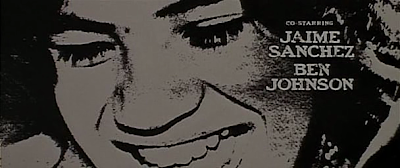Classic, Production-Code-and-genre-busting production where moral absolutism evaporates in the dry heat of the high desert, where gunsmoke and (then shocking) sprays of technicolor blood obscure the clear path traditionally bordered on one side by the White Hat good un and Black Hat baddie on the other. From the opening credit sequence, this one's special.

A posse approaches. They appear to be soldiery, but appearances deceive. We're soon to find out that they are the 'bad guys', in the guise of the good. In fact, they're quickly established as antiheroic outsiders, just trying to get by in a savage world were the lines between law and outlaw are so much toed sand marking out the verge of an indiscriminate bloodbath.

Our posse peer at a group of ragged frontier chillun, gringo y chicano, playing in the dust. The children laugh and smile, returning to their game: feeding scorpions to an ant's nest, emblematic deadly desert loners brought to heel by the incessant selfless hive. The scene is shocking, and punctuated by posterised stills of the closely cut action, small poses that function to not simply present the credits: the fully-fleshed reality of what we are seeing is flashed briefly into black & white portraiture, small pauses for reflection upon the falsity of the image. Black and white is out the window here. The harsh world of The Wild Bunch is riven by moral ambiguity and devoid of any such sentimental categories as innocence. We are but cruel children at play in the dust.

It's a picaresque film with political savvy. Though both 'sides' – outlaw posse and the authorities out to get them – are marked by the same moral ambiguity that renders good and bad just plain ugly, there's a strong anti-State undercurrent at work, a sensibility that fits with the time of its production. There's a sense that the chaotic formative days of the United States are coming to a close, that the organs of power are consolidating, mapped by the ever-growing network of railways, the rise of the automobile and the machine gun. Revolution is in the air, WWI a flood just around the corner of the box canyon whose roar can be heard and felt, but not yet quite understood. This setting is twisted in Peckinpah's hands into a narrative where individuals are shanghai'd into unwitting servitude to these freshly laid down lines, swearing allegiance to the myth that if you make your pot you can somehow jump the loop, more or less understanding only the imperatives of the day: staying alive. There are individuals caught here, but also groups: bands of brothers and, notably, stricken indigenous Mexican and North American communities, all of whose positions and complicities are sensitively handled.
A must-see Western.

No comments:
Post a Comment
Reckon?